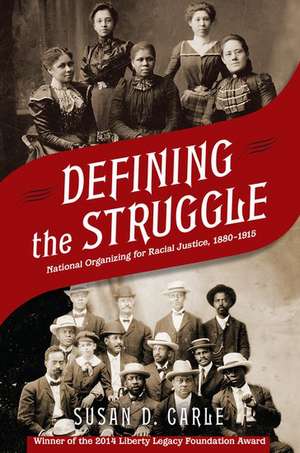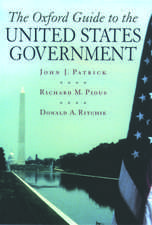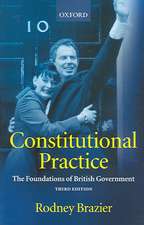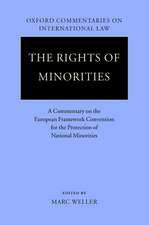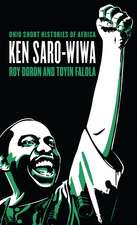Defining the Struggle: National Organizing for Racial Justice, 1880-1915
Autor Susan D. Carleen Limba Engleză Paperback – 18 iun 2015
| Toate formatele și edițiile | Preț | Express |
|---|---|---|
| Paperback (1) | 243.82 lei 31-37 zile | |
| Oxford University Press – 18 iun 2015 | 243.82 lei 31-37 zile | |
| Hardback (1) | 343.86 lei 31-37 zile | |
| Oxford University Press – 28 noi 2013 | 343.86 lei 31-37 zile |
Preț: 243.82 lei
Nou
Puncte Express: 366
Preț estimativ în valută:
46.65€ • 48.84$ • 38.60£
46.65€ • 48.84$ • 38.60£
Carte tipărită la comandă
Livrare economică 25-31 martie
Preluare comenzi: 021 569.72.76
Specificații
ISBN-13: 9780190235246
ISBN-10: 0190235241
Pagini: 424
Ilustrații: black & white illustrations
Dimensiuni: 231 x 155 x 28 mm
Greutate: 0.61 kg
Editura: Oxford University Press
Colecția OUP USA
Locul publicării:New York, United States
ISBN-10: 0190235241
Pagini: 424
Ilustrații: black & white illustrations
Dimensiuni: 231 x 155 x 28 mm
Greutate: 0.61 kg
Editura: Oxford University Press
Colecția OUP USA
Locul publicării:New York, United States
Recenzii
Susan Carle's Defining the Struggle: National Organizing for Racial Justice, 18801915 provides a useful entry point into an examination of the legal history of civil rights and its relationship to the historiography of the long civil rights movement.
Susan Carle writes a clear and convincing history of the first generation of civil rights organizers and advocates-the movement that started the Movement. We all stand on their shoulders. Let us remember their names and know their stories.
Susan Carle's study of nineteenth-century social and legal activism is ground breaking. By shedding new light on the historical roots of the Second Reconstruction and mapping the intellectual links between modern civil rights groups and long-forgotten visionaries, Carle has made a remarkable contribution.
Susan Carle vividly recounts the long and difficult struggle for African American voting rights in the United States. Carle's inspiring stories of heroic figures who persevered in the face of seemingly impossible odds are not only amazing; they are also timely. In light of the Supreme Court's recent decisions, this is a must read for activists who seek to engage in new forms of organizing, and for scholars who seek to produce new venues for creative thinking about what it means to be a full citizen of the United States.
This remarkable book lifts the veil that has obscured from view an entire early generation of civil rights lawyers. We learn here of organizations like the Afro-American League, the Afro-American Council, the National Association of Colored Women, the Niagara Movement, and the newly-formed NAACP and Urban League. Working in often desperate circumstances against formidable opposition, these tiny groups pioneered the civil rights movements' strategies of litigating test cases, mobilizing for legislative gains, and building social-service institutions. Their goals were not just legal equality, but economic justice and social welfare. It is astonishing to discover, thanks to Susan Carle's very moving as well as illuminating account, how much they were able to accomplish.
Graduate students and scholars will find Susan Carle's Defining the Struggle informative, as it pushes the boundaries of the early legal history of racial justice advocacy and modern civil rights activism back into the late nineteenth century. Readers and researchers will appreciate the extensive endnotes and bibliography of primary sources and secondary literature.
Susan Carle writes a clear and convincing history of the first generation of civil rights organizers and advocates-the movement that started the Movement. We all stand on their shoulders. Let us remember their names and know their stories.
Susan Carle's study of nineteenth-century social and legal activism is ground breaking. By shedding new light on the historical roots of the Second Reconstruction and mapping the intellectual links between modern civil rights groups and long-forgotten visionaries, Carle has made a remarkable contribution.
Susan Carle vividly recounts the long and difficult struggle for African American voting rights in the United States. Carle's inspiring stories of heroic figures who persevered in the face of seemingly impossible odds are not only amazing; they are also timely. In light of the Supreme Court's recent decisions, this is a must read for activists who seek to engage in new forms of organizing, and for scholars who seek to produce new venues for creative thinking about what it means to be a full citizen of the United States.
This remarkable book lifts the veil that has obscured from view an entire early generation of civil rights lawyers. We learn here of organizations like the Afro-American League, the Afro-American Council, the National Association of Colored Women, the Niagara Movement, and the newly-formed NAACP and Urban League. Working in often desperate circumstances against formidable opposition, these tiny groups pioneered the civil rights movements' strategies of litigating test cases, mobilizing for legislative gains, and building social-service institutions. Their goals were not just legal equality, but economic justice and social welfare. It is astonishing to discover, thanks to Susan Carle's very moving as well as illuminating account, how much they were able to accomplish.
Graduate students and scholars will find Susan Carle's Defining the Struggle informative, as it pushes the boundaries of the early legal history of racial justice advocacy and modern civil rights activism back into the late nineteenth century. Readers and researchers will appreciate the extensive endnotes and bibliography of primary sources and secondary literature.
Notă biografică
Susan Carle teaches legal ethics, anti-discrimination law, labor and employment law, and torts at American University Washington College of Law. She writes primarily about the history of social change lawyering, anti-discrimination law, and topics at the intersections between civil rights, employment, and labor law. In the past she has been a community organizer, civil rights lawyer, and union-side labor lawyer.
